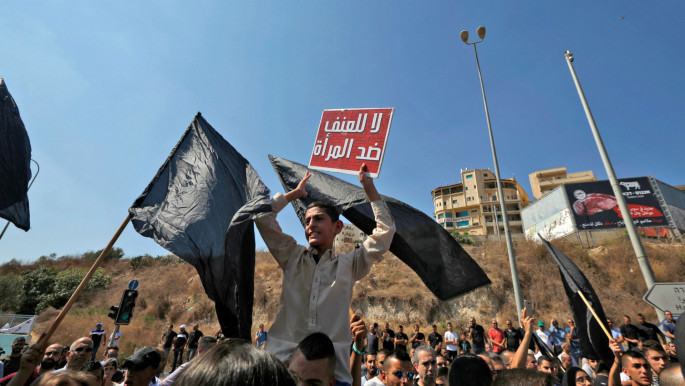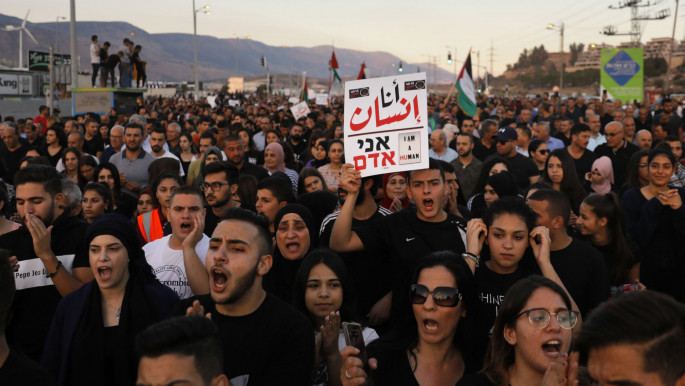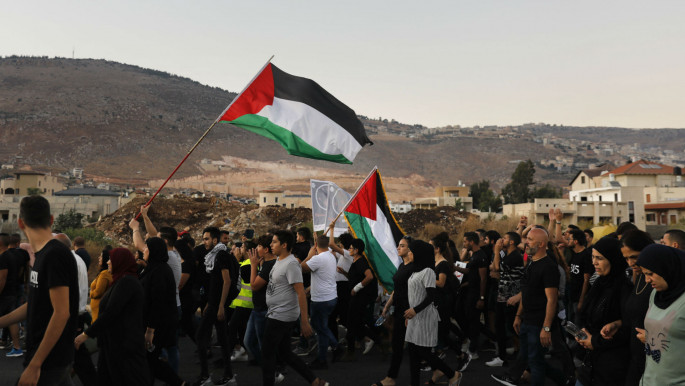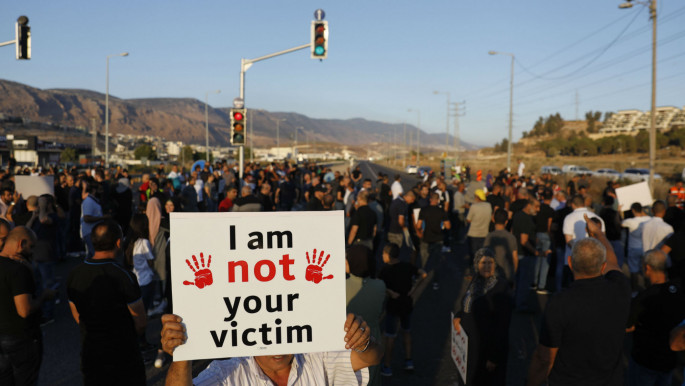A deadly gun violence epidemic has gripped Palestinian communities. Is Israeli police neglect to blame?
The case was closed a year ago, with Israeli police claiming there was not enough evidence to find the perpetrator. The community says everyone knows who did it.
Outraged at the lack of police action, Hiba's cousin, Raya Manaa, vowed to start a social movement to demand answers.
"We tried to see if we could do anything to fight the violence, or civil terror, that we were facing," Manaa told The New Arab. But it didn't take root.
Two years later, the grassroots youth movement has taken centre stage in Israel's national conversation, albeit for tragic reasons.
In early October, two other cousins of Raya, brothers Ahmed and Khalil Manaa, were gunned down in Majd al-Krum in broad daylight as children were leaving a nearby school.
 |
More than 75 Palestinian citizens of Israel have been killed so far in 2019 by gun violence, putting it on track to be the deadliest year in at least a decade |
 |
The killings, part of a spate of recent murders in the Palestinian community, proved to be a breaking point for local residents, with 4,000 or so protesting in front of the local police station to demand that they catch the assailant.
"Everybody knows who shot them and they are free, hiding somewhere," Raya says. "The police have done nothing to catch them".
Read more: 'No freedom without free women': Palestinians march against femicide
At Ahmed and Khalil's funeral the next day, thousands more joined the protests, demanding that the police clamp down on what residents say is an epidemic of gun crime.
A day later, on October 4, tens of thousands protested to denounce police inaction and political indifference in one of the largest mobilisations by Palestinian citizens in Israel since the Second Intifada.
 |
|
|
Palestinians protest against violence, organised crime and recent killings among their communities, in the town of Umm-Al Fahem on 4 October [Getty] |
The demonstrations saw a cross section of religious leaders, civil society and Palestinian Knesset members take to the streets, carrying signs reading 'Living in peace is already a dream' and 'Our children's blood is not cheap' as they marched in the north of the country.
Newly elected members of the Palestinian Joint List party even boycotted the swearing-in ceremony at the Knesset in protest, part of wider action which saw a one-day general strike that shut down schools, shops and local authority offices.
Read more: Palestinian hopes don't lie in Israel's election, but in America 2020
On the second day of the protests, hundreds of Palestinian cars and thousands of demonstrators shut down Highway 6 for several hours, one of the most important thoroughfares in Israel.
"A racist government has neglected us and the police have abandoned our neighbourhoods to gangs and criminals," Ayman Odeh, the head of the Joint List who attended the protests, said.
 |
Palestinians say the violence reflects decades of institutional discrimination and social exclusion, with deliberate political neglect allowing the killings to continue |
 |
Guns, crime and neglect
The brazen acts of violence which touched Raya Manaa's family capture the alarming reality of the spike of murders plaguing the Palestinian community, who say their neighbourhoods are awash with illegal guns, organised crime and revenge killings.
In 2018, around 70 percent of cases in which Palestinians were killed were closed without a conviction, activists say, fuelling further resentment over Israeli police indifference.
The Manaa brothers are among more than 75 Palestinian citizens of Israel killed so far in 2019 by gun violence, putting it on track to be the deadliest year in at least a decade.
An estimated 95 percent of shooting incidents in Israel occur in Palestinian communities, as do nearly 60 percent of murders.
The police say they are doing everything they can, from stepping up patrols to opening new stations in communities.
Over 3,500 illegal weapons have been seized so far this year, police say.
 |
|
| Palestinians protest against violence, organised crime and recent killings among their communities in the town of Majd al-Krum on 3 October [Getty] |
But Palestinians say the violence reflects decades of institutional discrimination and social exclusion, with deliberate government neglect allowing the killings to continue.
The response from Israeli political elites has further compounded this sense of indifference and discrimination.
"Arab society is a very, very violent society," Israeli Public Security Minister Gilad Erdan, who oversees the police, claimed in response to the spate of killings.
Read more: Palestine +100: Stories from a century after the Nakba
"It's connected to the culture there. A lot of disputes that end here with a lawsuit, there they pull out a knife and a gun."
Thabet Abu Rass, the co-director of the Abraham Initiatives, rejects this characterisation of the violence.
"They blame Arab culture," he told The New Arab, "but it is the same Palestinians on the other side of the Green Line in Nablus, Ramallah and Qalqiliya and they don't have the same number of killings."
Twitter Post
|
Enemies of the state
Israel's Palestinian citizens make up just 20 percent of the population but account for over 60 percent of all murder victims nationwide.
The community is descended from Palestinians who remained in the state after the war that surrounded its creation in 1948.
They have the right to vote but suffer discrimination and say authorities treat them like second-class citizens.
Large sections of the Israeli public view Palestinian citizens as a fifth column and demographic threat, with discrimination entrenched across housing, public services, education and employment.
Over half of Palestinian citizens in Israel live in poverty.
Alongside historic marginalisation, recent events have also contributed to widespread fear and suspicion of the Israeli state and police.
In a single week in October 2000, during the Second Intifada, Israeli police shot dead 13 Palestinian citizens of Israel who took to the streets in solidarity with protesters in the occupied West Bank and Gaza.
There has never been accountability for the killings.
"We are part of the State of Israel, but the state is not inside our Arab communities," Thabet Abu Rass told The New Arab.
"Unfortunately the Israeli police deal with us as enemies, not as equal Jewish citizens."
Others say the Israeli government is directly involved in crime in Palestinian communities through police neglect, a lack of economic investment and the abject failure to clamp down on the sale of illegal arms.
 |
There are an estimated 400,000 illegal weapons in circulation within Palestinian communities, with Israeli police turning a blind eye |  |
"There are more than 400,000 illegal weapons among Palestinians in Israel, and we are only two million people. A quarter of us are armed but the Israeli government is doing nothing to solve this problem," Raya Manaa told The New Arab.
Some put the figures even higher. In 2016, Palestinian Knesset member Issawi Frej quoted unofficial police data saying there are half a million unlicensed weapons in circulation.
That same year, a parliamentary commission of inquiry into the origins of illegal weapons presented by Frej was blocked by the then Likud-led coalition.
A recent report on Israel's KAN television channel alleged that as many as 75 percent of illegal weapons found in Palestinian communities come from the Israeli military, with some soldiers even involved in trafficking.
"They know where the weapons come from, but they choose not to take action," Manaa says.
'They know who killed my cousins'
The issue of gun violence is related to both criminal activity and insecurity, Abu Rass says, with some community members feeling they need to be armed to protect themselves from gangsters and crime clans.
Beyond gun violence, the near complete absence of the state in Palestinian communities allows criminal enterprise to thrive.
Until five years ago there were only three police stations in Palestinian communities across Israel, Abu Rass says.
"There is a vacuum in law and order, the state is replaced by gangsters, criminal groups and families," he told The New Arab.
Underpinning a large section of the criminal activity is deep rooted exclusion from the formal Israeli economy and competition over scarce resources.
 |
|
| Protesters wave the Palestinian flag in Majd al-Krum in Northern Israel [Getty] |
Around 20 percent of Palestinian citizens of Israel aged 18-22 are unemployed, Abu Rass says, with many drawn into a life of petty crime.
The average unemployment rate in Israel hovers around four percent.
In Palestinian communities nearly half the population lives below the poverty line, double the national rate.
A lack of land and banking services also pushes many to turn to the informal economy, including criminal activity such as drug dealing and money laundering.
Read more: Israel just bulldozed two basic principles for peace
With the police virtually absent, Israeli criminal organisations have embedded themselves in Palestinian communities, residents say, with little fear of punishment.
For many the heart of the issue is also one of citizenship and rights, with the state choosing to apply the resources of the government only to its Jewish citizens.
"The Israeli police's approach is that Jewish citizens are people to be served, while Palestinian citizens are people to be watched and scrutinised," Amjad Iraqi, a contributing editor at +972 magazine, told The New Arab.
"It is about which victims are worthy of accountability and justice, and which are not".
 |
It is obvious to every Palestinian in Israel that the government is involved directly in the crime we are facing, we know they have the ability to end it in two months, but they don't do it - Raya Manaa |
 |
Some point to the disparity in responses taken by Israel to different crimes.
When attacks on Jewish Israelis take place in Israel, or the occupied West Bank, the full force of the state mobilises to detain the suspect, put the assailant's hometown under curfew, arrest residents and relatives, and seize illegal weapons.
 |
|
| A protester holds up a sign during a rally against gun violence [Getty] |
Iraqi says both the Palestinian community and police know who the major gang leaders are, but law enforcement fails to open criminal investigations after gun attacks.
"They have the capacity and knowledge of what's going on but are deliberately stepping back. There is clear political policy behind this negligence".
Since Raya Manaa's cousins were brutally gunned down in broad daylight, the police have yet to make any arrests.
"They know who killed my cousins," she said.
"It is obvious to every Palestinian in Israel that the government is involved directly in the crime we are facing, we know they have the ability to end it in two months, but they don't do it."
The youth movement Manaa is part of has vowed to continue protests, now in their 17th day and one of the largest continuous demonstrations in Israel by Palestinian citizens in the past 20 years.
"We needed a big tragedy to move the community to take some action," she says.
"The solution will not come from the Israeli government. As the youth we have power to change things."
Charlie Hoyle is a journalist at The New Arab.





 Follow the Middle East's top stories in English at The New Arab on Google News
Follow the Middle East's top stories in English at The New Arab on Google News


